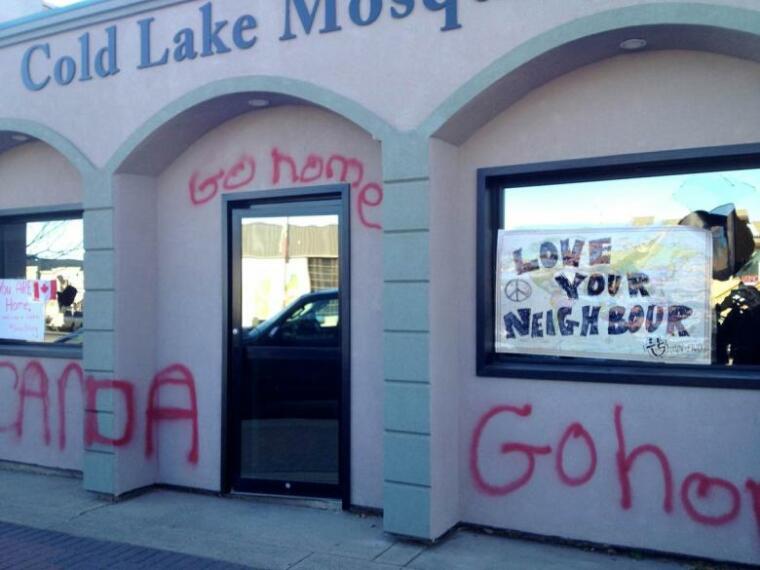Canadian lawmakers pass motion condemning Islamophobia

A motion urging federal politicians to condemn Islamophobia in Canada has been approved by the House of Commons earlier this week.
The non-binding motion, known as M-103, calls on the government to "condemn Islamophobia and all forms of systemic racism and religious discrimination," Global News reported. It was passed along party lines on Thursday by a vote of 201 to 91. Iqra Khalid, the MP who sponsored the motion, was applauded by her fellow Liberal MPs when she stood to vote.
Critics of the motion raised their concern that it could be a slippery slope to limiting freedom of speech and could even bring in Sharia or Islamic law.
"Do you have a valid concern about Islam? Do you disagree with Sharia Law? Uneasy about radical Islamic terrorism? The Liberals may very well classify you as Islamophobic," said Conservative Party of Canada leadership candidate Pierre Lemieux.
Andrew Scheer, who is also a contender for the leadership of the Conservative Party, stated before the vote that the motion "could be interpreted as a step towards stifling free speech and legitimate criticism" of Islam.
"M-103 is not inclusive. It singles out just one faith. I believe that all religions deserve the same level of respect and protection," he stated in an email to supporters. "I will be voting against it because I believe in Freedom of Speech," he added.
A poll conducted by the Angus Reid Institute indicated that Canadians are skeptical whether the motion will have any effect.
The survey results indicated that almost nine out of 10 Canadians have little faith that M-103 will accomplish anything, although they are split as to whether it should pass.
Twenty-six percent said that it's "not worth passing because it won't do anything," while 31 percent believe that it should be passed even for symbolic reasons. Another 31 percent said that the motion should not be passed because it threatens freedom of speech.
When asked how they would vote on the motion, 42 percent of the respondents said they would vote against it. Twenty-nine percent said they would vote in favor of it, and another 29 percent said they do not know or would choose to abstain.
A petition urging MPs to vote against the "restrictive 'anti-blasphemy'" motion has been signed by 79,500 people.
An alternative motion that condemned racism and discrimination against Muslims, Jews, Christians, and other religious groups was defeated by the Liberals in February.
 Christians don't have to affirm transgenderism, but they can’t express that view at work: tribunal
Christians don't have to affirm transgenderism, but they can’t express that view at work: tribunal Archaeology discovery: Medieval Christian prayer beads found on Holy Island
Archaeology discovery: Medieval Christian prayer beads found on Holy Island Presbyterian Church in America votes to leave National Association of Evangelicals
Presbyterian Church in America votes to leave National Association of Evangelicals Over 50 killed in 'vile and satanic' attack at Nigerian church on Pentecost Sunday
Over 50 killed in 'vile and satanic' attack at Nigerian church on Pentecost Sunday Ukrainian Orthodox Church severs ties with Moscow over Patriarch Kirill's support for Putin's war
Ukrainian Orthodox Church severs ties with Moscow over Patriarch Kirill's support for Putin's war Islamic State kills 20 Nigerian Christians as revenge for US airstrike
Islamic State kills 20 Nigerian Christians as revenge for US airstrike Man who served 33 years in prison for murder leads inmates to Christ
Man who served 33 years in prison for murder leads inmates to Christ


 Nigerian student beaten to death, body burned over ‘blasphemous’ WhatsApp message
Nigerian student beaten to death, body burned over ‘blasphemous’ WhatsApp message 'A new low': World reacts after Hong Kong arrests 90-year-old Cardinal Joseph Zen
'A new low': World reacts after Hong Kong arrests 90-year-old Cardinal Joseph Zen Iran sentences Christian man to 10 years in prison for hosting house church worship gathering
Iran sentences Christian man to 10 years in prison for hosting house church worship gathering French Guyana: Pastor shot dead, church set on fire after meeting delegation of Evangelicals
French Guyana: Pastor shot dead, church set on fire after meeting delegation of Evangelicals ‘Talking Jesus’ report finds only 6% of UK adults identify as practicing Christians
‘Talking Jesus’ report finds only 6% of UK adults identify as practicing Christians Mission Eurasia ministry center blown up in Ukraine, hundreds of Bibles destroyed: 'God will provide'
Mission Eurasia ministry center blown up in Ukraine, hundreds of Bibles destroyed: 'God will provide' Church holds service for first time after ISIS desecrated it 8 years ago
Church holds service for first time after ISIS desecrated it 8 years ago Burger King apologizes for 'offensive campaign' using Jesus' words at the Last Supper
Burger King apologizes for 'offensive campaign' using Jesus' words at the Last Supper Uganda: Muslims abduct teacher, burn him inside mosque for praying in Christ’s name
Uganda: Muslims abduct teacher, burn him inside mosque for praying in Christ’s name